The spice you can’t do without this season
The rich smell of nutmeg will surely fill the air in many kitchens during this Christmas season. Be it the traditional Christmas cake, the tried and tested Christmas pudding or the magical Christmas fruit mince pies, who can do without some grated or powdered nutmeg. Undoubtedly, the unique distinct pungent fragrance of nutmeg and the warm slightly sweet taste adds such a mystic smell and taste to our holiday treats. This time you can even try a nutmeg-roasted turkey or garlic and nutmeg rice for a difference to your family Christmas meal. Nutmeg, one of the spices of the Christmas season with the others being, cloves, cinnamon and ginger are all fragrant and exotic and anything made with these smells so much of Christmas.
 Nutmeg, known as Saddikka in Sinhala and Saddikkai in Tamil, scientifically Myristica fragrans in the family Myristicaceae is a spreading evergreen tree that reaches up to 15 to 20 metres in height. The fruit that is a pendulous drupe splits into two when fully mature exposing the crimson coloured leathery net like aril which is the spice mace. This surrounds a single shiny brown seed the nutmeg. So nutmegs are really seeds and not nuts as the name may imply. The fruit pulp is most often discarded.
Nutmeg, known as Saddikka in Sinhala and Saddikkai in Tamil, scientifically Myristica fragrans in the family Myristicaceae is a spreading evergreen tree that reaches up to 15 to 20 metres in height. The fruit that is a pendulous drupe splits into two when fully mature exposing the crimson coloured leathery net like aril which is the spice mace. This surrounds a single shiny brown seed the nutmeg. So nutmegs are really seeds and not nuts as the name may imply. The fruit pulp is most often discarded.
After collection of the aril enveloped nutmegs they are transferred for curing where the mace is removed, flattened out and dried. The nutmeg is gently dried in the sun during which time the seed shrinks away from its hard seed coat and rattles in its shell when shaken. Nutmeg is marketed in this form and prior to use the hard shell is broken and the seed taken out. Dried nutmeg is greyish brown and oval in shape.
In Sri Lanka no specific varieties have been identified. Nutmeg prefers cool climates as such the mid country areas in Sri Lanka are the best for growing nutmeg with about 80% of the cultivation being in the Kandy district. Kegalle and Matale are the other major growing areas. The Sri Lankan nutmeg has an intense sweet flavour and sublime aroma.
Storing and using nutmeg
Always choose whole nutmeg over ground. Store the nutmeg in an airtight container in a dark place. Heat, moisture and light will speed up the deterioration of the volatile oils that give nutmeg its distinctive flavour. If properly stored nutmeg will keep good for about a year. Just before use break the shell and grate the seed using a simple grater.
Components of nutmeg
As we all know, nutmeg is yet another culinary spice that we use in small quantities in our food mainly for its flavour. However, the humble looking brown seed has also been highly prized for its powerful medicinal value for hundreds of years. Components in the nutmeg include dietary fibre, protein, starch and traces of minerals such as manganese, potassium and calcium. The essential oil that accounts for 5 to 15% of the nutmeg seed comprises of several components of interest that include camphene, sabinene, geraniol, borneol, elemicin and myristicin with the latter being the most studied individual compound found in nutmeg.
Uses of nutmeg
Nutmeg goes well with both sweet and savoury dishes. It is widely used in fruit cakes, fruit desserts and fruit punch. It is good in stews and most egg and cheese dishes, white and cheese sauces and with potatoes, carrots, pumpkin, spinach, cabbage and cauliflower. A little bit of ground nutmeg on stewed fruits enhances both flavour and visual appeal. Nutmeg is also a necessary ingredient in many other Christmas favourites such as mulled cider, mulled wine and eggnog. Nutmeg also serves as a delicious topper to a hot cup of tea, milkshake or even hot cocoa. You can even add a little nutmeg to a fruit smoothie for a warming effect or into a tomato soup for an unusual depth of flavour.
The nutmeg essential oil is used heavily in the cosmetic and pharmaceutical industries and also as a natural flavouring in the food industry to replace ground nutmeg so as to leave no particles in the food.
Always only use nutmeg as a spice keeping amounts under control when the benefits will be apparent.
Health benefits
| |
The sweet spice quartet
|


